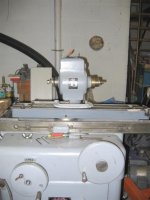RLamparter
Hot Rolled
- Joined
- Oct 4, 2008
- Location
- Central PA
K.O. Lee B923A head. The parts breakdown says it's a 203KDD but doesn't list an abec grade.
There are some on the net that say a current abec 3 bearing is better than a better grade bearing from 40 years ago because of improvements in bearing manufacture. I don't know whether to believe that or not.
What grade bearings are needed for a tool & cutter grinder? Do you have any favorite vendors who sell quality bearings. I'm hoping only to need one since I think I can hear which bearing is causing the sound.
RWL
There are some on the net that say a current abec 3 bearing is better than a better grade bearing from 40 years ago because of improvements in bearing manufacture. I don't know whether to believe that or not.
What grade bearings are needed for a tool & cutter grinder? Do you have any favorite vendors who sell quality bearings. I'm hoping only to need one since I think I can hear which bearing is causing the sound.
RWL
Attachments
Last edited:



